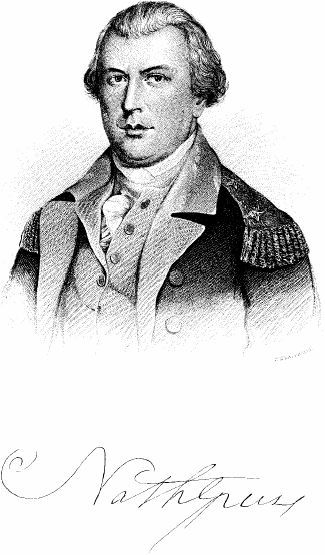Francis Vinton Greene - General Greene
Here you can read online Francis Vinton Greene - General Greene full text of the book (entire story) in english for free. Download pdf and epub, get meaning, cover and reviews about this ebook. year: 2011, publisher: Barnes & Noble, genre: Non-fiction. Description of the work, (preface) as well as reviews are available. Best literature library LitArk.com created for fans of good reading and offers a wide selection of genres:
Romance novel
Science fiction
Adventure
Detective
Science
History
Home and family
Prose
Art
Politics
Computer
Non-fiction
Religion
Business
Children
Humor
Choose a favorite category and find really read worthwhile books. Enjoy immersion in the world of imagination, feel the emotions of the characters or learn something new for yourself, make an fascinating discovery.
- Book:General Greene
- Author:
- Publisher:Barnes & Noble
- Genre:
- Year:2011
- Rating:3 / 5
- Favourites:Add to favourites
- Your mark:
- 60
- 1
- 2
- 3
- 4
- 5
General Greene: summary, description and annotation
We offer to read an annotation, description, summary or preface (depends on what the author of the book "General Greene" wrote himself). If you haven't found the necessary information about the book — write in the comments, we will try to find it.
After Washington, Greene is considered the ablest American officer to fight in the Revolution. According to a contemporary New York Times review of this 1893 biography, General Greenes story is told with just appreciation and reasonable fullness. No volume in the Great Commander Series deserves wider reading.
General Greene — read online for free the complete book (whole text) full work
Below is the text of the book, divided by pages. System saving the place of the last page read, allows you to conveniently read the book "General Greene" online for free, without having to search again every time where you left off. Put a bookmark, and you can go to the page where you finished reading at any time.
Font size:
Interval:
Bookmark:

This 2011 edition published by Barnes & Noble, Inc.
All rights reserved. No part of this publicationmay be reproduced, stored in a retrieval system, or transmitted, in anyform or by any means, electronic, mechanical, photocopying, recording,or otherwise, without prior written permission from the publisher.
Barnes & Noble, Inc.
122 Fifth Avenue
New York, NY 10011
ISBN: 978-1-4114-4724-0
CONTENTS
LIST OF ILLUSTRATIONS
From the painting by Charles Wilson Peale.
From The Campaign of 1776 around New York, by Henry P. Johnston, published by the Long Island Historical Society.
From The Campaign of 1776 around New York, by Henry P. Johnston, published by the Long Island Historical Society.
From Marshall's Life of Washington.
From Johnson's Life of Greene.
From Johnson's Life of Greene.
From Johnson's Life of Greene.
From Johnson's Life of Greene.
LIST OF AUTHORITIES CONSULTED
Life of Nathanael Greene, by George Washington Greene, 3 vols., 1871.
Life of Greene, by William Johnson, 2 vols., 1822.
Life of Nathanael Greene, by Charles Caldwell, 1819.
Life of Nathanael Greene, by W. G. Simms, 1849.
Life and Writings of George Washington, by Jared Sparks, 12 vols., 1858.
Correspondence of the American Revolution, by Jared Sparks, 4 vols., 1853.
Life of Washington, by John Marshall, 2 vols., 1832.
Life of Washington, by Washington Irving, 5 vols., 1859.
Memoirs of the War in the Southern Department, by General Henry Lee, 1813.
Campaign of 1781 in the Carolinas, by Henry Lee, third edition, 1824.
Battles of the United States, by Henry B. Dawson, 2 vols, 1858.
Field Book of the Revolution, by Benson J. Lossing, 1859.
Battles of the American Revolution, by Henry B. Carrington, 1876.
Campaign of 1776 around New York, by Henry P. Johnston, published by the Long Island Historical Society, 1878.
Life of Steuben, by Friedrich Kapp, 1859.
Life of General Kalb, by Friedrich Kapp, 1884.
Life of Knox, by Francis S. Drake, 1873.
Treason of Charles Lee, by George H. Moore, 1860.
History of the Independence of the United States, by William Gordon, 4 vols., 1788.
History of the American Revolution, by David Ramsay, 3 vols., 1793.
Journals of the American Congress, 17741788, 4 vols., 1823.
The Clinton-Cornwallis Controversy, by Benjamin F. Stevens, 2 vols., 1888.
History of the Campaigns of 1780 and 1781, by Lieutenant-Colonel Tarleton, 1787.
History of the American War, by C. Stedman, 2 vols., 1794.
Anecdotes of the Revolutionary War, by Alexander Garden, 1822.
CHAPTER I
ANTECEDENTS AND EDUCATION
N ATHANAEL G REENE was born in 1742, "on the 27th day of the fifth month," according to the entry in his father's diary. The Gregorian Calendar was not adopted in England or its colonies until ten years later, and March was then considered the first month. His birth was therefore on August 7, 1742. He was of the fourth generation of the descendants of John Greene, surgeon, of Salisbury, England, whose ancestors had lived for several generations in Dorsetshire, and are referred to in the parish records of births, marriages, and deaths, as gentlemen and landed proprietors. John Greene sailed from Hampton in the ship James, on April 5, 1635, and landed at Boston sixty days later. Like many others, he had left England in order to make his home in a land where he could worship God according to his own conscience; but he soon discovered that the theocratic government of Massachusetts Bay was more intolerable than that of the land he had left. He therefore followed Roger Williams into the wilderness, and aided him to found the colony of Rhode Island. The services of this little community in establishing civil and religious liberty have not received in public estimation the credit to which they are entitled. The colony was so small that it was overlooked among its more powerful neighbors, but "tall oaks from little acorns grow." The opinions of Roger Williams were shared by such an infinitesimal minority of mankind, two hundred and fifty years ago, that it was necessary that they should first be put into practice by a small community; and it is the glory of Rhode Island that the opinions of this handful of settlers on Narragansett Bay should now be the foundation principle of government among more than one hundred millions of English-speaking people scattered over the four quarters of the globe.
The principles on which Roger Williams founded his colony were: the right of every man to worship God according to the dictates of his own conscience; the right of the people to choose their own public officials of all classes; and the right of propertywhich last is upheld by all governments, but was carried so far by Williams that he denied the authority of any one to give or receive original titles to land in America without the consent of the Indians as primary owners. These rights were fully and completely secured by the charter for Providence Plantations which Williams secured from the Earl of Warwick and his associates under the Protector in 1643, and in that which Clarke secured from Charles II in 1663 for Rhode Island and Providence Plantations. The latter charter gave such complete civil and religious liberty, that, when the colonies revolted in 1776, and the others formed their State constitutions, it was only necessary in Rhode Island to pass an act of the Assembly substituting allegiance to the colony for allegiance to the King. No other change was necessary in its fundamental law, and under this charter its affairs were successfully administered, until 1843.
With Williams and Clarke and Gorton, John Greene helped to found this colony. He was in the first company to follow Williams from Salem, and he arrived at Providence in the spring of 1636, bringing with him his wife and five childrenfour sons and an infant daughter. Williams had bought his land at Providence from the Indian chiefs who owned it, and he conveyed it for a consideration of 30 to his "loving friends and neighbors," twelve in number, among whom was John Greene. Five years later John Greene, in company with a few others from Providence and a few from Newport, purchased from the Indians a tract on the west side of Narragansett Bay, about four miles wide and twenty miles long, which was at first called Shawomet, but afterward named Warwick in gratitude for the kindness shown them by the Earl of Warwick, then Governor-in-Chief and Lord High Admiral of the Colonies. Here John Greene passed the remainder of his days, and here his descendants were born. He received his full share of persecution from Massachusetts. When in 1637 he returned to Salem to sell his house, he was arrested and thrown into jail for having spoken disrespectfully of the magistrates, and having charged them with "usurping the power of Christ over men's consciences." In 1643, when Massachusetts attempted to claim jurisdiction over Shawomet, and seized Gorton and his neighbors and carried them to Boston for trial, Greene was obliged to escape across the bay to Newport with his sick wife, who died a few weeks afterward. In the following year, with Gorton and Holden, he was sent to England to lay their grievances before the Earl of Warwick's Committee, and from him they secured a decision in their favor, which, though appealed by Massachusetts, was never materially reversed. He died in 1659, his last public service being as one of a committee of ten selected in 1647 to organize the colony under the charter of 1643. His son was one of the ten "Assistants" to the Governor named for the first year in the charter of 1663.
His descendants multiplied rapidly in Warwick; they married young, lived long, and reared large families. Each generation in succession furnished men prominent in the communitygovernors, deputy governors, secretaries of the colony, and delegates to the General Assembly. Nathanael Greene was of the fourth generation of these descendants. He was the fifth of a family of nine childrentwo by a first marriage and seven by a second. His father, also named Nathanael, was a Quaker preacher of the most vigorous as well as the most narrow-minded and superstitious type. His son described him in after years as "a man of great piety, of an excellent understanding, and governed in his conduct by humanity and kind benevolence, but his mind was overshadowed with prejudice against literary accomplishments." He was also a large landed proprietor, and the owner of a forge, grist mill, flour mill, and saw mill, as well as a store for the sale of general merchandise. The forge and mills had been established by his father Jabez, and at his death the property passed equally to his six sons without being divided, and the business was continued by them. It was situated on Potowomut, a peninsula on the west side of Narragansett Bay just south of Warwick. In 1741 a second forge was established by the brothers at Coventry, about ten miles northwest of Potowomut, and the two establishments continued in operation till the close of the century. The property at both places gradually passed into the hands of Nathanael the preacher, and all of his eight sons were put to work in the forges or mills at an early age. At his death, in 1771, his sons inherited the property and continued the business jointly under the name of Jacob Greene & Co., but Nathanael Greene never paid any attention to it after he joined the army in 1775. Its value, exclusive of real estate, was appraised in 1743 at 8,055, with 2,408 of uncollected debtsa considerable sum in those days. The principal product of the forges was anchors, and these, together with the flour made at the mills, were transferred across the bay in sloops to Newport, bringing back return cargoes of ore and black sand from Pennsylvania, and wheat and coal from Virginia.
Next pageFont size:
Interval:
Bookmark:
Similar books «General Greene»
Look at similar books to General Greene. We have selected literature similar in name and meaning in the hope of providing readers with more options to find new, interesting, not yet read works.
Discussion, reviews of the book General Greene and just readers' own opinions. Leave your comments, write what you think about the work, its meaning or the main characters. Specify what exactly you liked and what you didn't like, and why you think so.











